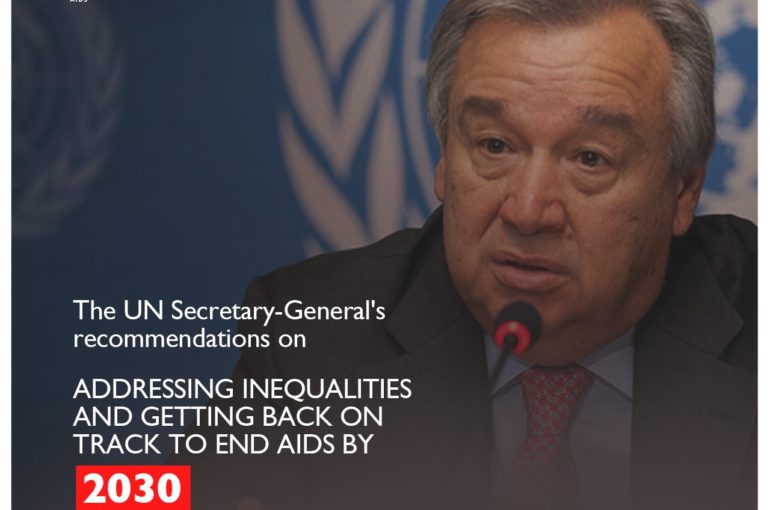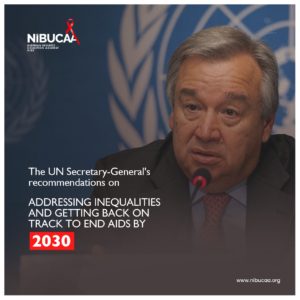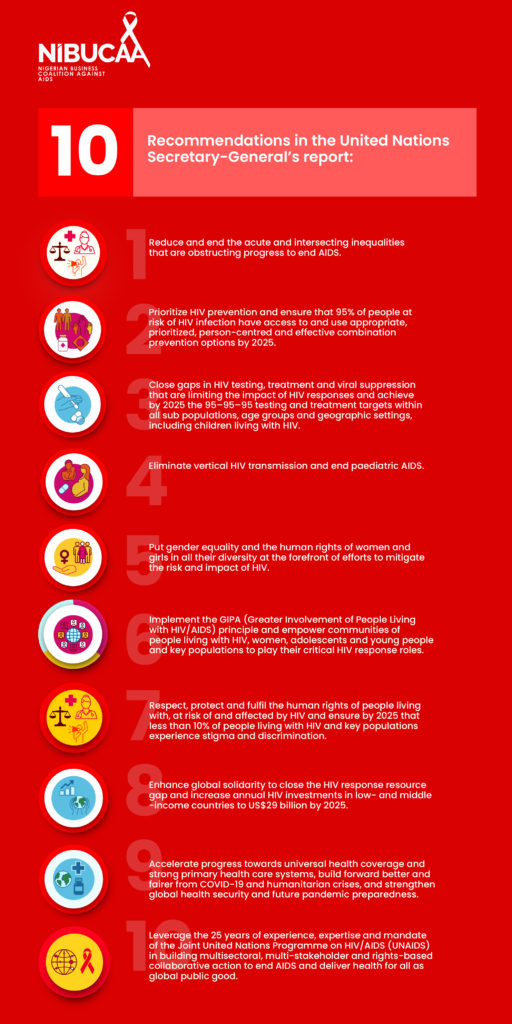A Call To End Inequalities to Accelerate The Fight Against HIV/AIDS
A Call To End Inequalities to Accelerate The Fight Against HIV/AIDS


Report of the United Nations Secretary General- Antonio Guterres
The United Nations has issued ten key recommendations to ending the AIDS pandemic as a public health challenge by the year 2030. Despite the major strides that has been recorded with the epidemic, the disease continues to increase in some places and population groups.
According to the United Nations Secretary-General, Antonio Guterres, in the new report submitted pursuant to General Assembly resolution 70/266, “It is imperative to break out of an increasingly costly and unsustainable cycle of achieving some progress against HIV but ultimately not enough to bring about an end to the pandemic, Inequalities are the key reason why the 2020 global targets were missed. By ending inequalities, transformative outcomes can be achieved for people living with HIV, communities and countries.”
The 2019 Data presents 1.7 million new HIV infections which is three times higher than the 2020 target of less than 500,000 new infections. In addition, the 2020 target of reducing AIDS-related deaths to a fewer than 500,000 a year was exceeded by the 690,000 AIDS-related deaths of 2019. The Covid-19 pandemic has disrupted the HIV targets and shifted the public health attention to itself, however this should be seen as an opportunity for countries to strengthen their pandemic preparedness and responses.
The report details successes and lessons from five years of Fast –track; the lessons from the countries, cities and communities that successfully fast-tracked their HIV responses over the last five years, how the 2025 targets can be achieved, the integration of HIV in systems for health and social protection and ending inequalities accelerate transformative progress for people living with HIV, communities and countries.
The set of 10 recommendations to get the world back on track to end the HIV epidemic include: addressing inequalities, prioritizing HIV testing and treatment targets to ensure that 95% of people, including children have access to HIV prevention services, enhancing global solidarity to increase annual HIV investments in low- and middle-income countries.

HOW CAN THE GOVERNMENT AND PRIVATE SECTOR BE A PART OF THIS?
The HIV epidemic has evolved from being a public health issue into a major development challenge of crisis proportions. With Effective leadership, co-ordination and collaboration across countries, sectors and communities, we can accelerate our response to ending the HIV epidemic. The new recommendations from the United Nations have reminded us that despite remarkable progress, there are staggering needs still unmet, it has also revealed that Ending AIDS by the year 2030 is in sight and possible. We need to ensure that the rights of individuals affected by HIV are balanced with interventions that are designed and implemented to address their needs.
To achieving these recommendations, the government and the private sector should consider the following:
- There is a need for Integration of HIV services into primary healthcare and other social services.
- The Civil organizations should be involved in policy design, budget formulation, monitoring and evaluation of programmes to ensure accountability.
- Large-scale Interventions should address the rights of people living with HIV.
- The technical expertise and resources of the private sector should be leveraged to respond the HIV epidemic. The private sector should complement government’s effort through community interventions and funding.
- There should be a synergy of HIV strategies and programmes, including those pertaining to human resources for health and related services.
- The response to the HIV epidemic should be based on a People-centered principle and People living with HIV should be treated with fairness and equity.


